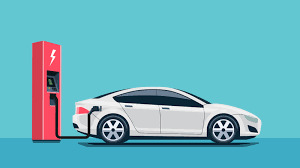As the world moves towards a greener and more sustainable future, the demand for electric vehicles (EVs) continues to rise. With governments, corporations, and individuals embracing clean energy, the electric vehicle market is rapidly expanding. However, with this growth comes the need for a robust and reliable electric vehicle charging infrastructure. In this guest post, we will explore the current landscape of EV charging, its challenges, and future trends, with a focus on the role Shakarzahi LLC plays in this transformative industry.
Understanding Electric Vehicle Charging
Electric vehicle charging refers to the process of supplying electrical power to EVs so that they can operate. Unlike traditional internal combustion engine vehicles, which rely on gasoline or diesel, EVs use electricity stored in batteries to power their motors. This electricity must be replenished at regular intervals, just as gasoline is refilled in conventional cars.
There are three main types of EV charging options:
- Level 1 Charging: This is the most basic form of charging, using a standard household outlet (120V). While it’s convenient for at-home charging, it is the slowest option, taking up to 20 hours for a full charge.
- Level 2 Charging: Typically found in public charging stations or installed in residential garages, Level 2 charging uses a 240V outlet, similar to those used for large appliances. It provides a faster charge, often taking around 4-8 hours to fully charge an EV.
- DC Fast Charging (Level 3): This is the fastest method of charging, typically found at commercial charging stations or along highways. DC fast chargers can provide up to 80% charge in as little as 20-30 minutes, making them ideal for long-distance travel.
The Growth of EV Charging Infrastructure
With the rise in electric vehicle adoption, there has been a significant push to expand the charging infrastructure. Both private companies and government bodies are investing heavily to ensure that EV drivers have access to sufficient charging points, whether at home, work, or on the road.
Governments around the world are incentivizing the expansion of charging networks by providing subsidies and grants for businesses and homeowners to install EV chargers. Cities and municipalities are also working to integrate EV charging stations into urban planning, ensuring that future developments are equipped with the necessary infrastructure to support the EV revolution.
Shakarzahi LLC recognizes the importance of this infrastructure in promoting the use of electric vehicles. By developing innovative solutions that cater to the needs of both businesses and consumers, the company is playing a pivotal role in expanding the availability of charging stations and making them more accessible across various regions.
Challenges Facing the EV Charging Industry
Despite the rapid growth of electric vehicle charging infrastructure, there are still several challenges that need to be addressed to ensure the seamless adoption of EVs:
- Insufficient Charging Stations: Although the number of EV chargers is increasing, there is still a shortage in many regions, especially in rural and less densely populated areas. This “range anxiety,” or the fear of running out of power before finding a charging station, remains one of the top concerns for potential EV buyers.
- Charging Time: While DC fast charging has reduced the time needed to recharge an EV, it still takes longer than refueling a conventional vehicle. Innovations in battery technology and charging speeds are needed to make EV charging more convenient for everyday users.
- Cost of Infrastructure: Installing EV charging stations, especially high-speed chargers, can be expensive for businesses and municipalities. This cost barrier must be overcome to ensure widespread availability.
- Standardization: The lack of standardized charging equipment and networks can be confusing for consumers. Different automakers use various charging connectors and network providers, complicating the charging experience for EV owners.
Shakarzahi LLC: Pioneering the Future of Electric Vehicle Charging
At Shakarzahi LLC, innovation is at the heart of everything we do. Recognizing the need for a widespread, reliable, and cost-effective charging network, we are committed to developing cutting-edge charging solutions that cater to the diverse needs of today’s EV drivers.
Our efforts focus on three core areas:
- Expanding Charging Networks: Shakarzahi LLC is partnering with businesses, governments, and municipalities to install EV charging stations in key locations, ensuring that drivers have access to reliable charging options whether they are commuting to work, running errands, or traveling long distances.
- Innovative Charging Technology: We are continually investing in research and development to improve the speed and efficiency of our charging stations. This includes exploring advancements in ultra-fast charging, which could reduce charging times to minutes, and wireless charging, which would allow drivers to charge their vehicles without plugging in.
- Sustainability and Affordability: At Shakarzahi LLC, we believe that electric vehicle charging should be both sustainable and affordable. That’s why we are integrating renewable energy sources, such as solar and wind power, into our charging stations, reducing the environmental impact of EV charging while keeping costs low for consumers.
The Future of EV Charging
Looking ahead, the future of electric vehicle charging is incredibly promising. With advancements in battery technology, charging speeds, and infrastructure development, the barriers to EV adoption are rapidly diminishing. Shakarzahi LLC is at the forefront of these changes, working to ensure that electric vehicle charging is convenient, efficient, and accessible for all.
One exciting trend is the growth of smart charging, where charging stations are connected to the internet and able to communicate with both the grid and the vehicle. This allows for more efficient energy management, including charging during off-peak hours when electricity rates are lower. It also paves the way for vehicle-to-grid (V2G) technology, where EVs can store excess energy and feed it back into the grid when needed.
Another key development is the expansion of charging stations in non-traditional locations, such as shopping centers, hotels, and restaurants. This will make charging more convenient for consumers, as they can charge their vehicles while going about their daily activities.
Conclusion
Electric vehicle charging is a critical component of the transition to a more sustainable, cleaner transportation system. With the demand for EVs growing, the need for a robust charging infrastructure has never been greater. Shakarzahi LLC is proud to be a leader in this space, providing innovative solutions that make EV charging more accessible, reliable, and sustainable. By continuing to push the boundaries of what’s possible, we are helping to drive the future of mobility forward.







